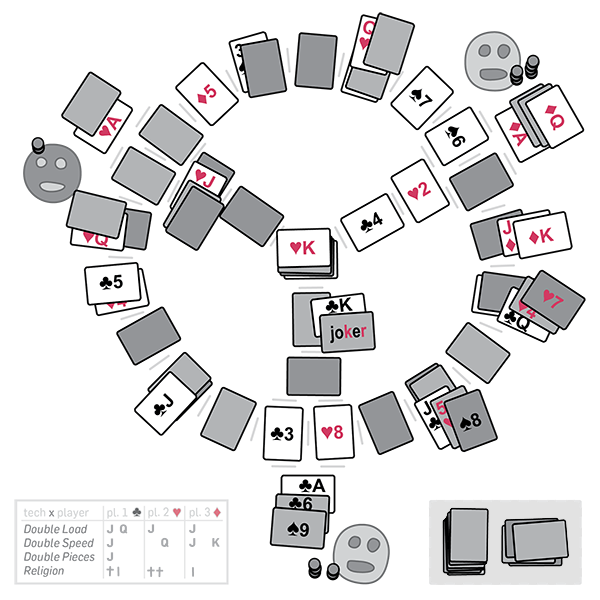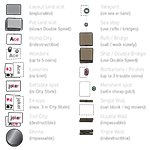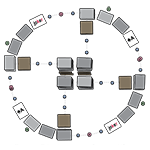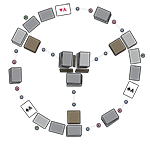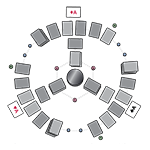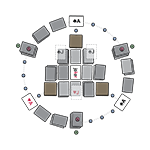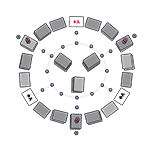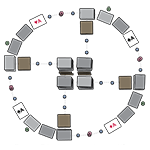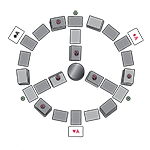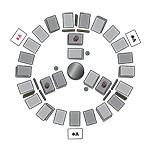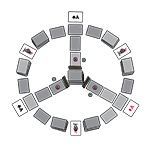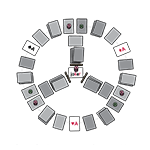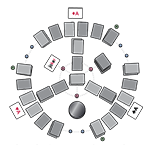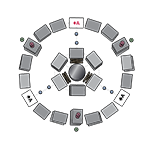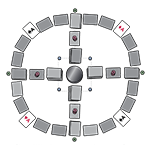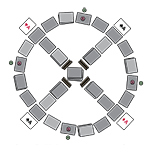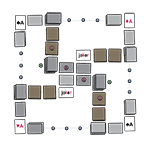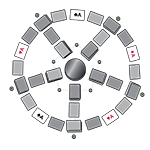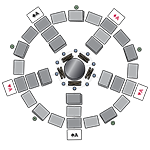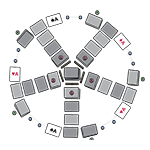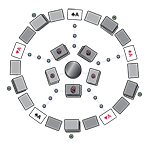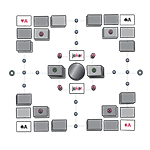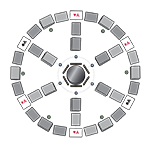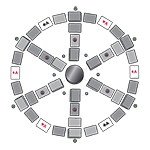-
Suit NationsA card game about civilizations for 2 - 8 players.
![Suit Nations]()
-
- 2024
-
- Type:
- Layout / System
- Players:
- Difficulty:
- Ext. Diff.:
-
- Version
- 1.2
- Updated on
- 5 Oct 2024
- In Finnish:
- Maakansat (Kansojen kehitys)
- Sibling games:
- Suit Taboo, Mystery Machine
- Table of contents
-
-
BASICS
REQUIREMENTS
It's recommended to have a soft surface, so that it's easy to pick cards from the table.
- Players: 2 - 8 players. (See Player variations for team play with 5 - 8 players, and solo adventures.)
- Cards: 2 standard decks of 52 cards, preferably with 2 or 3 jokers each. (The decks can look different, better so.)
- Coins/Chips: Some coins of different sizes / values (poker chips are fine) to be used as gold (and for various extensions).
- Pen & paper: Simple bookkeeping equipment (eg. paper & pen) for marking steps in the progress table.
- Dice: One dice (with numbers 1 - 6) to tell the outcome of missions (by Queens) and attacks (by Kings) and more (with extensions).
BASIC IDEA
The game is more like a board game (than a card game) and unfolds like the phenomenon of human civilizations over eras (but in about 3 - 4 hours).
- The game layout is made by laying cards (2 - 10 and jokers) face down (1 - 4 cards per slot) into a custom shape. The layout also has a few aces (A) face up - they are the home cities of each civilization (♤, ♧, ♥, ♦), while the face cards (J, Q, K) are the game pieces.
- On their turn the players can perform one action with each game piece and limitless city actions. Each piece has its own use:
- Jacks are pioneers that can explore cards in the layout as well as handle and haul loads - they are the core engine of your civilization.
- Queens are diplomats on a mission to spread religion or learn technology. They are useful for civ. points, but useless for hauling cards.
- Kings are army: useful for attacking (and defense) but can also handle and haul loads. (They can also control distant structures like Walls and Bridges.)
- Aces are not game pieces but each nation's home city, where they can produce and dismantle various things and make technological progress.
- The game opens up by unlocking technologies and having more game pieces. When the deck runs out, it's reshuffled and a new era begins.
- After the last era, the nation with the most civ. points wins - points are gained from technological and religious progress (and much more with extensions).
-
LAYOUT
INITIAL DEALING
The cards from the two decks are divided into the game pieces & cities (J, Q, K, A) and the remaining deck (2 - 10 and jokers).
- LAYOUT: The dealer shuffles the era deck (72 - 78 cards) and creates the layout by laying about 20 - 30 cards face down into a shape. (See Maps for ideas.)
- The map can feature crosses (eg. T, Y, X shapes), and each slot can be connected to one or many slots as long as things are visually clear.
- TERRAIN: Initially each layout slot has just 1 card. The dealer can put a few extra cards (up to 4-card-slots) on certain spots (use about 5 - 20 cards in total).
- The extra cards indicate a non-smooth terrain (where Double Speed tech. won't work) but on the other hand a richer terrain for exploration (and better for defense).
- Leave enough (= around half) cards in the deck. Since there are as many eras as players, each gets to take about as many cards as are left in the deck.
- ACES: The dealer also includes 1 ace face up per player (of different suits) into the layout with at least 3-layout-slot distance from each other.
- SUITS: Finally, the suits are picked for the players by drawing suits, and thus the players locations decided as well.
- The dealer offers the included Jacks face down, and others pick one. If many pick the same, those pick new until resolved - the dealer gets the last suit.
- START UP: Each player is given 5 gold and a Jack game piece, and the player on the dealer's left starts the game.
LAYOUT MECHANICS
- STACKED PIECES: There is no limit to how many pieces (from the same/different nations) can be on the same layout slot - they are simply stacked together.
- LOADED PIECES: All game pieces and the city can carry a load: the loaded 1 or 2 cards are placed face down above the piece / city (= left partly visible).
- The main game pieces (J, Q, K) have 1 loading space until unlocking Double Load tech. to carry 2 cards (or mix 2 loads, eg. 1 card + 1 other cargo type).
- The cities (A) can always carry 2 face down cards, but in addition each cargo type (with extensions) has its own loading space and limits (eg. 2 cards + 3 coins).
- Loaded cards (of the same suit) can be used for political and city actions if their sum (+ gold) pays the action price (eg. ♧4 + ♧7 >= 10). Joker is 10 of any suit.
- GOLD PILES: Gold is kept in front of each player as piles of coins/chips of different values. It's globally available when needed.
- PROGRESS: The technological and religious steps are marked into a global progress table, where players are columns and branches rows.
- ERAS: After the era deck runs out, it's reshuffled from the dumped cards (next to the deck) by the next dealer clockwise. (So you can count eras by dealers.)
- ENDING: The game is played for as many eras as there are players (= each shuffles once). After the last era deck runs out, the exploration (action for Jacks) is no longer allowed and a final countdown follows.
- 5 coins are placed where the era deck was. Each time the last explorer's (= who consumed the last card) turn starts, one coin is removed and a cycle of turns played. When there are no more coins to remove (= after 6 cycles), the game ends and the victorious civilization(s) (= with the most civ. points) celebrated.
ON YOUR TURN
You can play 1 action with each of your game pieces (J, Q, K) in free order, and limitless city actions before / after the piece turns.
- LAYOUT: The dealer shuffles the era deck (72 - 78 cards) and creates the layout by laying about 20 - 30 cards face down into a shape. (See Maps for ideas.)
-
CITY ACTIONS
ABOUT CITY ACTIONS
You can play limitless city actions before / after your game piece turns (but not during a piece turn).
- The action cards are picked freely from the loads of the city and any of your game pieces in the city - the cards are turned face up and discarded.
- Each city action can only use cards of a single suit (joker is 10 of any suit) and their total sum must be equal or higher than the action price.
- You can pay missing numbers (or even full price) in gold: 1 gold for 1 number. (For example, buy a Jack with 9 own suit + 2 gold = 11 own suit.)
- The currency for paying for (productive) actions is either your own suit or foreign suit. The foreign price is always 5 higher for all city actions.
PRODUCTIVE CITY ACTIONS
A: MINE GOLD
- Mine +2 gold out of 5 own suit / 10 foreign suit, or +5 gold out of 10 own suit / 15 foreign suit.
A: PRODUCE A GAME PIECE
- A new game piece costs its number equivalent with your own suit (J = 11, Q = 12, K = 13) or 5 more with foreign suit (J = 16, Q = 17, K = 18).
- The newly produced game piece is put face up on the city. It's ready for action on your next turn.
A: RESEARCH TECHNOLOGY
- Similarly, unlocking a tech. step costs the type equivalent with own suit (J = 11, Q = 12, K = 13) or 5 more with foreign suit (J = 16, Q = 17, K = 18).
- The step is marked as J / Q / K into the player-tech-cell in the progress table (= each player is a column, each tech. branch is a row).
- The logic also applies to branches from extensions but they are gained linearly: 1 -> 2 -> 3. (So 1st step costs 11 (+ 5), 2nd step 12 (+ 5), 3rd step 13 (+ 5).)
UNPRODUCTIVE CITY ACTIONS
A: DECOMPOSE LOADS
- Discard any loaded cards on the city, or on your game pieces in the city, for the cost of 1 gold per card. (The cards are not revealed.)
A: DISMANTLE GAME PIECES
- Discard your game pieces located in the city to gain +5 gold per piece. However each loaded card on the piece drops the gains by 1 gold.
A: TURN TO GOLD (once per player turn)
- You can convert your whole turn to +1 gold, if you skip all other actions. (In Suit Allies both allies must skip their turn in succession to get +1 gold jointly.)
-
MAIN ACTIONS
COMMON ACTIONS
J / Q / K: MOVE
- Any game piece (J, Q, K) can move 1 slot in the layout to any connected neighbour on its turn - even on to a foreign city (= placed on the Ace).
- With Double Speed tech. you can first move 1 slot (for free) to a 1-card-terrain (including cities) and then play the main action of the piece.
J / Q / K: HANDLE
- Handling means exchanging loads of a game piece with loads of your other pieces (J, Q, K) and/or home city (A) on the same or neighbouring slot.
- Cards can be moved freely between the loads of the source (on its slot) and target pieces / city (on the target slot) - but not between separate targets.
- For example, J next to home A with K can give (0-2) cards to K and/or A and/or take (0-2) cards from them, but cannot move loads between A and K.
- However, the loads of Queens can only be exchanged with their home city (A) and/or pieces in the city (to ensure the purity of their mission).
- This applies both ways: a J or K can only handle loads of a Q if either or both are at home A. (On the road Js and Ks can only exchange with each other.)
J / Q / K: QUIETUS
- Any game piece (J, Q, K) can also just decide to end its journey anywhere: the game piece and any load on it is discarded. (No gains nor pains.)
POLITICAL ACTIONS
J: EXPLORE
- Jacks can look at the layout cards under them and optionally take 1 card as load: the card is put face down above the Jack.
- Any cards that are not taken, are turned face up after exploration. They still work the same way, but are now known to everyone.
- If a card is loaded on the Jack, a new replacement card is drawn from the deck and placed on top of the pile face down.
- Exploring action is not allowed during the final countdown (= after the last era deck has run out), as there's no source for new cards.
Q: MISSION (proselytize / learn tech.)
- The Q's purpose is to travel to a foreign city (A -> A) to spread religion or learn technology. The mission is executed from the same or adjacent slot.
- There are 2 types of missions: small require at least 5 of a suit, and full at least 10. The Q reveals 1 or 2 cards from her load and pays any missing gold.
- All missions involve a dice gamble (Q rolls first, then A) whose winner (with higher total, if any) is rewarded. In a full mission, the Q is rewarded in any case.
- RELIGION: Religious missions require 5 (small) or 10 (full) of own / matching suit. With own suit can target any city, otherwise only matching suit.
- Religious progress is collected as half steps (either | or -), which accumulate to point worthy and gamble affecting full steps (✝).
- The winner of the dice gamble (if any) gains one half step, and in a full mission the Queen always gains an extra half step (so at best 1 full step: ✝).
- The gamble outcome is affected by the nations' prior religious progress: each side gains +1 gamble strength per 1 full step (eg. Q: ✝ vs. A: ✝✝ = +1 for A).
- TECHNOLOGY: Tech. missions require 5/10 of non-matching foreign suit: Q can target any city whose suit does not match the used card(s).
- In both types the Q declares the tech. slot, and the following gamble is affected by each nation's progress steps on that branch (eg. 2 steps vs. 1 step -> +1).
- TECH. DEBATE (5): In a small mission, the Q declares an existing tech. slot to copy from the city and gains it if Q wins the gamble.
- If the city wins, they gain another step on the declared branch (if has options, can choose which slot). If the branch is already fully researched, no gains.
- TECH. PROJECT (10): In a full mission the Q declares and gains a nouveau tech. slot (that neither has), while the city only learns the tech. if they win the gamble.
K: DEMAND (military)
- A loaded King can make a demand against any other player with pieces on the same or neighbouring slot. The target can either accept or reject.
- The demand can include a handling action for exchanging loads with the target piece / city (including Luxuries and Wonders), and/or receiving gold from them.
- If accepted, the attacker's loads are discarded (= disarmed), the agreed exchange happens, and the K's turn is used up. If rejected, the turn continues.
K: ATTACK (military)
- A loaded K can attack any city or game piece (except their own) from the same or adjacent slot using 1 or 2 cards from his load (can pay partially in gold).
- 1 vs. 2 HITS: A small attack (= 1 hit) requires at least 5 of own / foreign suit, while a full attack (= 2 hits) requires 10 own / foreign suit.
- STEALING: In a full attack with own suit, the attacker gets to steal with the 2nd hit. The defender always decides how the 1st hit is absorbed.
- The attacker indicates the target, and reveals and discards the used load (and gold). The outcome depends on 1. strength, 2. terrain and 3. combat.
- STRENGTH: The strength is added up from the involved game pieces on each side (each side on their slot): K = 3, Q = 2, J = 1 (and A = 0).
- TERRAIN: The terrain on the defender's slot can aid the defending side: closed terrain (= 2 - 4 cards) gives +1, while home city terrain +2 (not for foreigners).
- COMBAT: Both parties roll a dice, the attacker first. The numbers from strength and terrain are added to the dices and the side with the higher total wins.
- For example, K + J + 5 (dice) vs. A + Q + 2 (city-terrain) + 2 (dice) becomes 9 (= 3 + 1 + 5) vs. 6 (= 0 + 2 + 2 + 2). The attacker wins (= 9 > 6).
- If the attacker wins, the target is damaged by 1 or 2 hits based on the attack type (small = 1, full = 2). Otherwise nothing happens.
- 1ST HIT: The defender decides where to absorb the 1st hit, if has options to choose from: which one of the loaded cards (or other load) to discard.
- 2ND HIT: The attacker decides where the 2nd hit (in a full attack) lands. A game piece can only be hit once there's no load on it.
- With own suit the attacker can decide to steal the hit load as attacker's own load (after seeing it). (Extensions bring more valuable options to destroy/steal.)
- PIECES: If a game piece has no protecting load left on it, the next hit destroys it. However the defender can choose to pay to stay alive.
- To keep the piece the defender must pay for it in gold: J = 1 gold, Q = 2 gold, K = 3 gold. If stealing, the attacker gets the gold (otherwise it's just lost).
- CITIES: The cities are indestructible and won't give out gold. (With extensions you can destroy/steal Luxuries & Wonders in them, or the 2nd city in Settlers).
-
PROGRESS
TECHNOLOGY
There are 3 technological branches and each can be completed 3 times in free order - once for each game piece type: J, Q and K.
- Double Load increases the load capacity of the piece type to 2 cards. (Initially each can only carry 1 card - except Aces always 2 cards.)
- Double Speed allows the pieces to move 1 slot (for free) to a 1-card-terrain before consuming the main action of the piece turn.
- Double Pieces allows the player to have 2 pieces of the same type. Each starts with support for 1 piece type per player.
SCORING
The player / team with the most civilization points after the last era wins the game. (If shared, then shared.)
- SCIENCE: The technological branches do not just help with game mechanics but can also yield civ. points (= max 6 p. in total).
- The 1st completed tech. branch (with all 3 steps in the progress table cell) gives 3 p., the 2nd completed branch 2 p. and the 3rd only 1 p.
- The Money Techs extension brings 3 more tech. branches (= 6 branches in total: 3 double-techs and 3 money-techs).
- RELIGION: Religion is gained as half steps and each full step (= 2 half steps) is worth 1 p. The players can collect up to 5 full steps (= max 5 p. in total).
- Each half step is marked with a line: first a vertical line, then a horizontal line to form a cross (= ✝ sign). So in total can have 5 crosses (= ✝ signs).
- CULTURE (with extensions): Extensions lighten up the cultural aspects of the civilizations.
- WONDERS: Each wonder (= coin) in the city is worth 1 p. - each Ace supports as many wonders as the nation has full religion steps (= 1 coin per 1 cross ✝).
- LUXURIES: Each luxury is worth 0.5 p. (rounded down in total), or 1 p. in a luxury combo. (Luxuries come from Artifacts and Shrines.)
- CITY STATES: Each nation with the envoy majority (by suit) in a city state gains 1 p., and another 1 p. if they are the suzerain (= 3 envoys).
- 2ND CITY: With Settlers player variation, the 2nd city yields 1 p. for the nation, or 2 p. if it's a City State (= 1 p. extra for being the suzerain).
- CONTROLLED WALLS: Each city wall is worth 0.5 p., while distant walls yield 0.5 p. for a King next to it with no rivals.
- CONTROLLED BRIDGES: Each bridge in a bridge network under King's control is worth 0.5 p. (and the total rounded down), or 1 p. if has 2 coasters.
- TREATY TRAITORS: Each traitor cross (marked with X in the progress table) punishes with -1 p. They come from broken treaties.
-
-
PLAYER VARIATIONS
variation: SUIT STRANGERS (for 2 - 8 players)
Playing as suit strangers one or more suits are shared by two players - mostly meant for 5 or more players (but works with fewer as well).
- The only change is that Double Pieces technology is dropped from the game. You can also mix in players who don't share a suit.
- Preferably the same suit game pieces are from different decks (so look visually distinct), and the same suit Aces located far from each other.
- The envoys in City States benefit both suit nations. However, the suzerain does not gain control of the incoming flow of its Walls (applies to all players).
variation: SUIT ALLIES (for 3 - 8 players)
Playing as an allied team progress, victory & gold are shared (= suit based), while Double Pieces technology is dropped.
- Accordingly the columns in the progress table are suits, and each team starts with 10 gold, while each player still starts with 1 Ace and 1 Jack.
- The allies cannot make political actions towards each other, but are allowed to exchange loads with each other (if both agree).
- In terms of military features (strength, controlling Walls and Bridges, counter attacks from Barbarians) the allies function as if one nation.
- Both cities serve as their home cities (and support the same Wonders). Exceptionally their Turn to gold city action requires both to skip their turn.
- The teams can be agreed or picked randomly (by drawing suits), and likewise player locations agreed or decided randomly (= dice roll winner chooses).
- You can also include non-allied players: each starts with (1 or) 2 A's, 2 J's, 10 gold and Double Pieces tech. for all types.
- Combined with Walls extension, any wall side controlled by two allied K's is jointly controlled by both (they decide together, and get points together).
variation: SETTLERS (for 2 - 4 players)
The layout can be prepared with 1 - 4 settable slots (using face up jokers), and the following actions added:
- City action - PRODUCE SETTLER: Producing a settler costs (its number equivalent) 14 of own suit or 19 foreign suit, and allowed if has an available Ace.
- Each nation starts with all 3 Double techs for Ace: Double Load (always), Double Pieces (= can produce a settler) and Double Speed (for settlers).
- Upon damage the settler (A) is discarded / can pay 4 gold (= A) to stay alive. Upon stealing the attacker can swap the (discarded) Ace to his free Ace (if has).
- Common actions: A - MOVE / HANDLING / QUIETUS: The settler supports the common actions (moving, handling, quietus) for game pieces (as if a J or K).
- Main action: A - ESTABLISH 2ND CITY: The settler can establish the city when on a free settable location: the Ace is placed under the joker (and the load on it).
- The joker-ace-city provides the common city actions but allows to pay own suit price for foreign suit actions. (Technically, the foreign suit price is dropped by -5.)
- If attacked, jokers (like Aces) are 0 in strength, but add +2 as home city terrain. However the Ace can be destroyed (with no pay-to-stay-alive), which makes the spot settable again - upon stealing the attacker can swap it to his own free Ace.
- If combined with City States the nation must first become their suzerain before can establish the 2nd city (except when steal-swapping the Ace).
- Upon establishment the envoys are discarded and the behaviour of the slot changed. Only once the Ace is destroyed, the city retains its autonomous state.
- Note. To visually distinguish the settable joker from normal jokers, pick visually distinct jokers, or, say, place a small stick behind the settable spot.
- CULTURE: Finally, in the end the 2nd city yields 1 civ. point for the nation, or 2 p. if it's a City State (= 1 p. extra for being the suzerain).
variation: QUESTS (for a few players)
You can also reward the nations with extra civ. points for completing quests - or even design special layouts for cooperative (= all win or fail) or competitive (= the first to accomplish wins) quests.
- quest example: The first to complete a holy work gains 2 p. Typically the path to the Shrine has some barbarians and walls to clear or sea steps to sail.
- quest example: Settling a settable location (in Settlers) - or becoming the suzerain of a City State - and protecting it until the end of that era.
-
-
EXTENSIONS
ABOUT EXTENSIONS
It's strongly recommended to try some extensions. Here are extensions that are not layout related:
- TREATIES allow to form written agreements that can either disallow the parties from doing something or allow it but punish the traitors.
- PRE-MODS allows to kick start the game (= more initial pieces, techs or gold), and are useful in special layout designs.
- MONEY TECHS allows to research cheaper own suit / foreign suit prices and gaining gold from productive city actions.
Extensions with items that can be transported on the map (= attacked, loaded, stolen and reinstalled into a city):
- WONDERS allows to build (up to 5) wonders with enough progress under Religion (= 1 wonder per 1 cross ✝). Each is worth 1 p.
- ARTIFACTS allow to produce a luxury from 2 identical cards (excluding jokers). They use Luxury mechanics (= each item is worth 0.5 p., or 1 p. in a combo).
- SHRINES are attractive layout spots where Queens can convert 2 straight flush cards (excluding jokers) into a Luxury item.
Extensions that add interactive spots in the layout (in addition to Shrines above):
- PORTALS allow travelling non-locally in the layout (usually at the edges of the world). Portals are either paired or grouped into larger constellations.
- MERCHANTS are attractive spots in the layout that appear here and there to sell cheap gold.
- BARBARIANS are troublesome slots in the layout where trouble can strike at random or as a response to interactions.
- CITY STATES are autonomous cities that become friendlier (and point worthy) by sending envoys to them. (Especially recommended with very few players.)
Extensions with significant layout design tools that also allow nations to affect the layout dynamics in real time:
-
-
extension: TREATIES
TREATY MECHANICS
Treaties are written agreements between rival (= non-allied) civilizations that do not break any game rules.
- The treaty can have many rules defined. Each rule is either breakable or unbreakable.
- UNBREAKABLE: Anything that asks to not do some action can be agreed to be unbreakable - the player simply cannot play the action (as defined).
- For example, two nations can agree to be unable to attack any game piece of each other during the remaining era.
- BREAKABLE: Alternatively you can agree about anything in a breakable way, and be punished for breaking it.
- Each traitor gets 1 traitor cross in the progress table (marked as an X under Traitor row) which brings -1 civ. point. After broken, the treaty no longer binds.
- Alternatively you can agree to custom penalties: eg. losing gold (if has too few, must use Turn to gold until paid).
- As an example, nation A will only spread culture to nation B, if they don't explore the lands that are within 4-slot-distance from the city of nation A.
- UNBREAKABLE: Anything that asks to not do some action can be agreed to be unbreakable - the player simply cannot play the action (as defined).
- Forming a treaty is a free action that is done globally during a player turn and can involve multiple nations and include exchanging gold.
- Exceptionally, treaties can include exchanging loads but requires to instantly use the related piece turns for handling action (with the normal physical proximity).
- In unclear cases consult a 3rd party, or then no punishment / disallowance. You can also set restrictions for treaties in general (eg. can last max. 2 eras).
- The treaty can have many rules defined. Each rule is either breakable or unbreakable.
-
extension: PRE-MODS
GIFTS & TECHS
Use these mods to kick-start the game and jump closer to the mid game. (Recommended if the layout consumes a lot of cards.)
- PRE-GIFTS: Start the game with more gold or game pieces than normally, or give out Luxuries, pre-built Walls, Maritime).
- When including pre-built walls, rafts and bridges in the layout, you can optionally disable building new ones.
- PRE-MOVES: You can also define custom locations for the initial game pieces. (Typically part of the layout design.)
- PRE-TECHS: Pre-complete some steps in the technological progress cells.
- You can either decide to give each player / team the same pre-advancements, or define how many there are and each can decide for themselves.
- PRE-GIFTS: Start the game with more gold or game pieces than normally, or give out Luxuries, pre-built Walls, Maritime).
-
extension: MONEY TECHS
TECHNOLOGY
This extension adds 3 new monetary tech. branches - you can include all or just some. Each can be researched 3 times for completion.
- CHEAPER OWN: Each step allows to pay 1 number less for all own suit prices (in all political and city actions).
- CHEAPER FOREIGN: Each step allows to pay 1 number less for all foreign suit prices (in all political and city actions).
- CITY BANKS: Each step gives you +1 gold for all productive city actions - received after the city action.
- Productive actions are those with own suit / foreign suit or special card prices (eg. 2 identical cards). (So Decomposing loads, Dismantling and Turn to gold are out.)
-
-
extension: WONDERS
WONDER MECHANICS
This extension allows to build Wonders into the city with enough religious progress.
- The wonders built into a city are visualized as coins on the Ace (often piled together), each coin is worth 1 civ. point.
- Each city supports as many wonders as the nation has full steps in religion (eg. 2 wonders with 2 crosses: ✝✝) - so up to 5 wonders (with 5 crosses: ✝✝✝✝✝).
- Wonders (coins) can also be loaded on game pieces (J, Q, K) but each coin takes up 1 loading space (unlike when placed on the Ace).
- The wonders can be attacked like any load (while on a piece or in the city), and accordingly the 2nd hit with own suit can steal a wonder (= coin is moved).
CITY ACTIONS
- BUILD A WONDER (productive): Producing a wonder (1 coin) costs 15 own suit or 20 foreign suit, but you can also get them by stealing (with K).
- However producing a wonder (or installing a stealed one) requires the equivalent religious progress (= 1 coin for 1 cross ✝).
- DISMANTLE WONDER (unproductive): You can dismantle wonders in the city, or loaded on your pieces in the city, to gain +5 gold per wonder.
-
extension (common): LUXURIES
LUXURY MECHANICS
This extension provides common luxury item mechanics used in Artifacts and Shrines extensions.
- Luxuries are created from 2 suitable non-joker cards (see the extensions) - one of the cards is collected and kept face up, the other discarded.
- Luxuries can be loaded on game pieces, but are kept face up in the load - each takes up 1 load spot as normally.
- When loaded to a city, the item is put (face up) under the Ace and takes up no loading space (= no limit for luxuries).
- Upon attacking the luxuries work like other load: they can be attacked, and the 2nd hit (with own suit) can steal a luxury item (from a game piece or a city).
- When the game ends, the players gain civ. points from the luxury items in the cities, while any luxuries on the road are discarded away.
- CIV. POINTS: Each luxury item in the city is worth 0.5 p. alone (total rounded down), but elevated to 1 p. in a luxury combo.
- COMBOS: Each luxury item of the same number or same suit and adjacent number (= straight flush) as another luxury in the same city is doubly worthy.
- For example, ♤4 + ♥4 and ♦3 + ♦4 as well as ♧3 + ♧3 + ♧2 + ♥2 are valid combos, so all related cards are worth 1 p.
- Storywise, each suit relates to a cultural luxury: Spades (♤) for spices, Clubs (♧) fine textiles, Diamonds (♦) jewelry & gems, and Hearts (♥) wine & art.
CITY ACTIONS
- DISMANTLE LUXURY (unproductive): You can convert any luxuries in the city, or loaded on your game pieces in the city, to gain +5 gold per item.
-
extension: ARTIFACTS
ARTIFACT MECHANICS
This extension uses the common Luxury mechanics and introduces artifacts: a way to produce luxuries at the city.
CITY ACTIONS
- PRODUCE AN ARTIFACT (productive): You can merge 2 identical cards (= same number and suit) into 1 luxury item. Exceptionally you can't use jokers nor gold.
- One of the cards is discarded and the other placed face up under the Ace overlapping any other luxuries.
- PRODUCE AN ARTIFACT (productive): You can merge 2 identical cards (= same number and suit) into 1 luxury item. Exceptionally you can't use jokers nor gold.
-
extension: SHRINES
SHRINE MECHANICS
This extension uses Luxury mechanics and introduces holy places: special layout spots (eg. coffee plates) where Queens can do holy work.
- LAYOUT: The dealer can place 1 (or 2) pedestals as shrines into the layout (with same distance from Aces as other cities). The spots are impassable terrain.
- Each side of the shrine (= direction with a connected layout slot) is totally separate from the others - there can be separate donations on each simultaneously.
- DONATIONS: When adjacent to a holy place Queens can donate (1 or 2) loaded cards (except jokers) by placing them face up on it (pointing towards the Q).
- The 2nd donation (on that side) must always be the same suit & adjacent number (eg. ♥2 + ♥3, or ♧5 + ♧4) as the 1st one.
- If there are Walls between the donator and the shrine, they must be cleared first (the shrine says no to everything).
- COMPLETION: The work is completed (by any nation) by donating the 2nd card (of the same suit & adjacent number as the 1st).
- As a token of completion, the Queen chooses which card to take face up as load (as a luxury item, and hurries home) while the other is discarded.
- ATTACKING: Kings can attack the donations from the same slot that they were donated from (pointing to that direction).
- The shrine has 0 in strength but +2 for terrain (= as if a home city). Any nations with pieces on the attacker's slot can help in defense (with their strength).
- The attacker rolls, then (someone for) the shrine. 1 hit destroys 1 card, 2 hits 2 cards - with own suit can steal a donation with the 2nd hit (as face down load).
MAIN ACTIONS (political)
- Q - HOLY WORK: When next to a shrine, Q's can donate 1 or 2 loaded (non-joker) cards of the same suit & adjacent numbers.
- The 1st card is placed face up (pointing towards the Q), while the 2nd completes the work: the Q loads one card face up (as a luxury) and discards the other.
- LAYOUT: The dealer can place 1 (or 2) pedestals as shrines into the layout (with same distance from Aces as other cities). The spots are impassable terrain.
-
-
extension: PORTALS
PORTAL MECHANICS
This extension requires rings (or other ring like items) as tokens for portals in the layout that allow to teleport from one to another.
- The spots are most often placed on sea (see Maritime) replacing the sea coin, but can also be placed on land above the topmost layout card.
- The spots are entangled (in pairs or larger constellations) and game pieces can move from one to another entangled spot - as if moving to a neighbour.
- With many choices the player simply decides where to travel to (no Colombos effect). For owning bridge networks (in Maritime), the sides are disconnected.
-
extension: MERCHANTS
MERCHANT MECHANICS
This extension introduces merchants: face up cards in the layout that sell one-time cheap gold (before disappearing and reappearing elsewhere).
- MERCHANT SLOT: The dealer marks a few (1 - 6) layout slots by placing a special token (eg. a small stone or a dice) in front of them.
- Each merchant slot is agreed to correspond to a dice number (or many). The slot can be of any normal terrain (= not an Ace or other non-changing special slot).
- OPENING THE SHOP: The dealer decides how many merchants to include (usually 1 or 2). To open a shop, a dice is rolled to decide the spot.
- There can only be 1 active merchant per slot, and he stays until (kidnapped or) traded with. The merchant should always move to a new slot (unless only 1).
- The topmost card of the slot is turned face up (unless already), and the token is moved on top of the slot to indicate that the shop is open.
- Any cards, even the merchant, can be explored and taken as normally. If the merchant is kidnapped, the shop closes. (Merchant cannot be K attacked.)
- CLOSING THE SHOP: After trading with (or kidnapping) the merchant, the token is put aside, a replacement card drawn and a dice rolled (for his next location).
- Exceptionally, during the final countdown the merchant card stays face up and only the token is moved aside (as there's no replacement cards left).
MAIN ACTIONS (political)
- J / Q / K - TRADING: Any game piece can give the merchant 1 or 2 cards of his number to gain 5 or 10 gold.
- As always, jokers are number 10 of any suit. The cards are revealed and discarded: if the same number, gains 5 gold per card. The merchant disappears.
- MERCHANT SLOT: The dealer marks a few (1 - 6) layout slots by placing a special token (eg. a small stone or a dice) in front of them.
-
extension: BARBARIANS
TROUBLE MECHANICS
This extension introduces layout slots where trouble (eg. barbarians and pirates) can strike at random, or as a response.
- LAYOUT: Any layout slot (except cities) can be marked with 1 - 3 trouble coins to indicate a risky region where barbarians / pirates can strike.
- The coins are placed above the topmost layout card - or on sea they replace the sea coin (and vice versa if destroyed) and should be visually distinct.
- You can also place the coins on the same slot as Merchants or even City States. Next to Walls they choose to block any flow (= King movements).
- TROUBLE TIME: There are two ways to annoy the barbarians and be attacked by them.
- Barbarians always launch an instant counter attack after any political action on / to / from the slot they are on towards the nation on his slot.
- The barbarians also voluntarily defend nearby Walls and counter attack after attacking a wall layer next to them (that they are able to defend).
- If the player left any game pieces on a slot with trouble coins when his turn ends, he must roll a dice per slot to see if they're attacked.
- The trouble is avoided by rolling a higher number than the trouble coin count on the slot (eg. 3-6 against 2 trouble coins). Otherwise they attack.
- Barbarians always launch an instant counter attack after any political action on / to / from the slot they are on towards the nation on his slot.
- BARBARIAN ATTACK: The barbarians always target the highest piece on the slot (K > Q > J) - with 2 equal, the defender chooses which.
- Each trouble coin has a strength of 2 in battles (like Q). The battle works as normally, and if the barbarians win they deliver 2 hits (= full attack).
- ATTACKING BARBARIANS: You can attack barbarians from the same or adjacent slot (on land, sea or sea-land). Each coin has a battle strength of 2.
- A small attack (= 1 hit) is futile as it only hits their invisible loads. A full attack (= 2 hits) destroys 1 coin and if stealing (with own suit) yields +5 gold.
- LAYOUT: Any layout slot (except cities) can be marked with 1 - 3 trouble coins to indicate a risky region where barbarians / pirates can strike.
-
extension: CITY STATES
CITY STATE MECHANICS
This extension adds the concept of city states represented by face up jokers in the layout.
- LAYOUT: The dealer can add 1 - 4 jokers face up in the layout (as autonomous city states) using the same distance rules that apply for Aces.
- Queens can send envoys to the city states to make them friendlier (towards the suit). With 3 envoys of a suit, that suit (nation) becomes their suzerain.
- Note. To avoid visual confusion with jokers as normal layout cards, pick visually distinct jokers for city states, or, say, place a small stick behind the city.
- MISSIONS (Q): With active envoys your Queens can send small missions (= at least 5) to them. In the dice gamble, their level always matches yours.
- TECHNOLOGY: With 1 envoy you can learn the J/1st techs, with 2 envoys up to Q/2nd, and as the suzerain any tech. type (J, Q, K or 1, 2, 3).
- RELIGION: With 1 envoy you can only proselytize if you have less than 1 full step (✝), with 2 envoys less than 2 full steps (✝✝) - only the suzerain has no limits.
- UNDER ATTACK (K): The joker provides no battle strength, but is city terrain (+2). Any nations with pieces (and Barbarians) in the city can also defend it.
- If attacked succesfully the attacker can destroy 1 donation per 1 damage hit, with own suit can steal one of the donations (as face down load).
- With Walls, the suzerain is in control of the city walls (except in Suit Strangers) - alone they just say no. In Settlers variation only the suzerain can establish the 2nd city (over a city state): The envoys are discarded and behaviour changed (until the Ace is destroyed).
- CIV. POINTS: In the end the suit nation(s) with envoy majority (= at least 2 or the only 1) in the city state gains 1 p., and another 1 p. for being the suzerain.
- In Suit Allies / Strangers envoys benefit both nations (of the suit), but the civ. points are halved for each sharing nation (= 0.5 p. for majority, or 1 p. if suzerain).
MAIN ACTIONS (political)
- Q - SEND ENVOYS: Your Q's can donate cards of your suit to a city state from the same or adjacent slot (with no Walls on the way).
- The cards are placed face up under the joker (as envoys). The city state supports up to 3 envoys - new cannot be sent until some old are removed.
- Q - PAY OFF ENVOYS: Your Q's can pay off envoys from a city state with 2 gold per envoy - the player decides which card(s) to discard.
- LAYOUT: The dealer can add 1 - 4 jokers face up in the layout (as autonomous city states) using the same distance rules that apply for Aces.
-
-
extension: WALLS
LAYOUT
This extension requires some small sticks (eg. long matches) to be used as walls (between two connected layout slots).
- BUILDING WALLS: Walls can be built (by Jacks) on the border of any two connected land slots, and on the border of land and sea (see Maritime).
- TRIPLE WALL: Triple walls are indestructible natural blocks that cannot be built, but are instead pre-placed into the layout. (You can pre-place any wall types.)
- DOUBLE WALL: A double wall (side by side) likewise totally disconnects the 2 slots, but only until one layer is destroyed - cannot be built around cities.
- SINGLE WALL: A single wall provides +2 battle strength for the defender in attacks (on either side), but allows actions to flow over (supporting Double Speed).
- BLOCKING MILITARY: However a single wall can block foreign K's from entering, if there's a blocker on the other side: a city (A), a King or a Barbarian.
- The blocker can decide whether the K can move over the wall to their side - or can ask gold for it (or a Treaty). If denied, the piece turn is not used up.
- The city decides whether K's can enter, but exiting cities is always allowed. For distant walls with Barbarians, or with blockers from multiple nations (on the same slot), the K movements are always blocked.
- ATTACKING WALLS: Kings can destroy a wall layer by a successful full attack (= at least 10) from a connected slot. (The attacker rolls first, then someone else.)
- The wall strength is +2 + strength from adjacent pieces (on both slots) of nations that want to defend (incl. Barbarians). There's no strength from terrain.
- CULTURE: Each nation gets 0.5 civ. points for each wall (or wall side) that are regarded as their territory, and the total is rounded down.
- The single walls around cities are always their territory, while distant walls require a King next to a wall with no rivals on the spot (= other K's or Barbarians).
- With double and triple walls, only the nearest wall layer is owned as territory. A single distant wall yields instead (+0.5) points for each side separately.
MAIN ACTIONS (political)
- J - BUILD WALLS: Your Jacks can build walls from the loads on their back (+ partial price in gold) on the border of two connected layout slots.
- 1 WALL: A single wall costs 10 own / foreign suit. A stick (typically a long match) is simply placed on the border.
- 2ND WALL: Jacks can also upgrade a distant single wall to a double wall with 10 own / foreign suit. Another stick is placed on the border (side by side).
- 2 WALLS: Or they can build a double wall at once with 20 own / foreign suit (except never around a city).
-
extension: MARITIME
MARITIME MECHANICS
This extension requires some coasters (= beer mats) to use as rafts/bridges and some coins to mark sea steps.
- SEA STEPS: Slots on the sea are marked by a single coin (or by special coins for Barbarians) without any cards under.
- CRAFTING RAFTS: Jacks can build a raft on an adjacent sea slot - once crafted, it cannot be disassembled (only sailed, upgraded or destroyed).
- The coaster is placed above the sea coin, and any coins for Barbarians are moved next to the coaster, or placed on it (but will not be moved with it).
- USING RAFTS: Multiple pieces (from multiple nations) can embark, but only the bottommost (= who arrived first) can sail: move the raft to a free sea slot.
- You cannot sail to a spot with a raft on it, but you can move from one coaster to another. A single coaster is slow: no Double Speed for walking / sailing.
- 2ND COASTER: Your J's can also add a 2nd coaster to an empty raft/bridge, which then supports Double Speed (for walking / sailing) and better defense.
- ATTACKING NAVAL STRUCTURES: You can attack a coaster (instead of attacking a pieces on it) from the same or any adjacent slot.
- All pieces on the coaster jointly participate in its defense. The coasters have no strength, but a double coaster gives +1 as terrain (= closed terrain).
- Destroying a coaster requires a full attack (= 2 hits, 1 is simply absorbed). If it's the only layer, the raft/bridge sinks and all pieces (and loads) on it are discarded.
- RAFTS vs. BRIDGES: Any coasters surrounded by land slots or other coasters are bridges (vs. rafts/ships) and each can yield 0.5 p. (So a double can yield 1 p.)
- CULTURE: The nation to whom a bridge network (= all adjacent bridge slots) belongs gets 0.5 p. for each (bridge) coaster in it - the total is rounded down.
- A King on the network without rivals (= foreign K's or Barbarians) owns it all - otherwise only owns the coasters directly under him (without rivals on the same slot).
MAIN ACTIONS (political)
- J / Q / K / A (as settler) - SAIL: The bottommost piece on a raft can sail: move the raft to an adjacent empty sea slot.
- For fluency, the player is allowed to change the order of his own pieces aboard, but the raft can only be sailed by one piece per player turn.
- Ships (= 2 coasters) can be sailed 2 sea steps. If the piece has Double Speed also: 1 sea step + 1 other action, or 1 sea step before/after (dis)embarking.
- J - CRAFTING A RAFT / BRIDGE: Jacks can build rafts and bridges from the loads on their back - partial price can be paid in gold.
- 1 COASTER: Jacks can craft a raft / bridge (= 1 coaster) to an adjacent empty sea slot with at least 10 own / foreign suit (or less with gold).
- UPGRADE TO 2: They can also upgrade an adjacent empty raft/bridge to a ship/double-bridge (= 2 coasters) with at least 10 own / foreign suit (or less with gold).
- 2 COASTERS: J's can also directly build a ship / double bridge (= 2 coasters) to an adjacent empty sea slot with at least 20 own / foreign suit (or less with gold).
-
-
MAPS
MAP SIZES
There are 5 size categories for maps, based on how many basic layout cards they take (including fat piles, but excluding any cities).
- The S and M categories are played normally, while L, XL and XXL categories require extra eras.
- Any layouts can have customizations for era length or deck size, as well as restrictions and requirements for extensions.
- All the layouts below are only examples (for inspiration). If you have good ideas for layouts, you can email them to:
infokoodikulmafi
legend: ABOUT MAPS
![Map legend Map legend]()
size: S maps (30 - 35 cards, for 1 - 4 players)
2 players
![Treasure Island for 2 Treasure Island for 2]()
3 players
![Treasure Island for 3 Treasure Island for 3]()
![Center Wonder for 3 Center Wonder for 3]()
![Stranded Start for 3 Stranded Start for 3]()
![Sea Eye for 3 Sea Eye for 3]()
4 players
![Treasure Island for 4 Treasure Island for 4]()
size: M maps (35 - 40 cards, for 2 - 5 players)
3 players
![Shared Wonder for 3 Shared Wonder for 3]()
![Step by Step for 3 Step by Step for 3]()
![Autonomous Equilibrium for 3 Auto Equilibrium for 3]()
![Center Castle for 3 Center Castle for 3]()
![Center Goodies for 3 Center Goodies for 3]()
![Double Ring for 3 Double Ring for 3]()
4 players
![Shared Wonder for 4 Shared Wonder for 4]()
![Center Equilibrium for 4 Center Equilibrium for 4]()
![Bridged Islands for 4 Bridged Islands for 4]()
5 players
![Shared Wonder for 5 Shared Wonder for 5]()
![Equal Sea Wonder for 5 Equal Sea Wonder for 5]()
![Axe Wheel for 5 Axe Wheel for 5]()
![Double Ring for 5 Double Ring for 5]()
size: L maps (40 - 45 cards, for 4 - 6 players, play 1 extra era)
4 players
![Grid Wonder for 4 Grid Wonder for 4]()
6 players
![Equal Sea Wonder for 6 Equal Sea Wonder for 6]()
size: XL maps (45 - 50 cards, for 5 - 7 players, play 3 extra eras)
6 players
![Shared Wonder for 6 Shared Wonder for 6]()
size: XXL maps (50 - 55 cards, for 6 - 8 players, play double eras)
- (None yet.)
-
TABLES
SCORING TABLES (including all extensions)
MATERIAL POSSESSIONS (temporary)
- featureciv. pointsnotes
- Wonders1 p. per coin (on Ace)max. 5 p. (= 5 coins, 1 per ✝)
- Luxuries0.5 p. (rounded down) or 1 p. (in a combo)see combo details in Luxuries
- Walls0.5 p. per control spot (rounded down)adjacent to an Ace or unrivalled King
- Bridges0.5 p. per coaster (as bridge)owned by a King on the network / slot
- Envoy majority / suzerain1 p. (majority) / 2 p. (suzerain = 3 envoys)suzerain has 3 envoys in the City State
- 2nd city1 p. (on a settable spot) / 2 p. (on a City State)double points if on a City State
POLITICAL PROGRESS (permanent)
- featureciv. pointsnotes
- Religion1 p. per full step (= 1 cross ✝)max. 5 p.
- Treaties-1 p. per broken treaty(or agreed custom penalty)
SCIENTIFIC PROGRESS (permanent)
- featureciv. pointsnotes
- (Tech. branches - each has 3 steps)1st branch: 3 p. 2nd: 2 p. 3rd: 1 p.max. 6 p. (= 3 completed branches)
- Double Load(completed for J / Q / K)can load 2 cards (or other load)
- Double Speed(completed for J / Q / K)gains 1 free move to 1-card-terrain
- Double Pieces(completed for J / Q / K)can have 2 pieces of the type
- Cheaper Own (from Money Techs)(completed in steps: 1, 2, 3)-1 price for own suit
- Cheaper Foreign (from Money Techs)(completed in steps: 1, 2, 3)-1 price for foreign suit
- City Banks (from Money Techs)(completed in steps: 1, 2, 3)+1 gold for productive city actions
CITY ACTION PRICE TABLES (all extensions)
CITY ACTIONS - PRODUCTIVE
- actionprice result
- Mine 2 gold5 own suit / 10 foreign suit2 gold
- Mine 5 gold10 own suit / 15 foreign suit5 gold
- Research tech. (slot #1)11 own suit / 16 foreign suitJ type / 1st step
- Research tech. (slot #2)12 own suit / 17 foreign suitQ type / 2nd step
- Research tech. (slot #3)13 own suit / 18 foreign suitK type / 3rd step
- Produce a pioneer (J)11 own suit / 16 foreign suit1 Jack
- Produce a diplomat (Q)12 own suit / 17 foreign suit1 Queen
- Produce an army (K)13 own suit / 18 foreign suit1 King
- Produce a settler (A)14 own suit / 19 foreign suit1 Ace (as Settler game piece)
- Build wonder15 own suit / 20 foreign suit1 coin (on Ace)
- Produce an artifact2 identical cards (no jokers)1 luxury item (face up under Ace)
CITY ACTIONS - UNPRODUCTIVE
- actionprice result
- Decompose loads1 loaded card (on any piece / city)-1 gold
- Dismantle game pieceJ / Q / K (or A as settler)5 gold
- Dismantle wonder1 coin5 gold
- Dismantle luxury1 luxury item5 gold
- Turn to gold(once per player / team turn)1 gold
PIECE ACTION PRICE TABLES (all extensions)
MAIN ACTIONS - COMMON (game pieces)
- action price result notes
- Move (J / Q / K / A)-move 1 or 2 land stepsDouble Speed: 1 free move to 1-card-terrain
- Sail (J / Q / K / A)-move 1 or 2 sea stepsbottommost can sail (2 coasters = Double Speed)
- Quietus (J / Q / K / A)-discarded piece and loadscan be done anywhere (= an act of mercy)
- Exchange loads (J / Q / K / A)-exchanged loadsfrom the same or adjacent slot (Q only with A)
MAIN ACTIONS - POLITICAL (game pieces)
- action price result notes
- Merchant trade (J / Q / K / A)1 or 2 same number5 or 10 goldfrom the same or adjacent slot
MAIN ACTIONS - POLITICAL (J)
- action price result notes
- Explore (J)-(optionally) take 1 or 2 cardsfrom the same layout slot
- Craft a raft/bridge (J)10 own / foreign suit1st coaster (= raft / bridge)to an adjacent empty sea slot
- Upgrade raft/bridge (J)10 own / foreign suit2nd coaster (= ship / double bridge)on an adjacent empty coaster
- Build a ship/double-bridge (J)20 own / foreign suit2 coasters (= ship / double bridge)to an adjacent empty sea slot
- Build 1st wall (J)10 own / foreign suit1 wall layer (stick)to a connected border (supports up to 2 walls)
- Buld 2nd wall (J)10 own / foreign suit2nd wall layer (sticks)on a distant wall (not around a city)
- Build a double wall (J)20 own / foreign suit2 wall layers (sticks)to a connected non-city border
MAIN ACTIONS - POLITICAL (Q)
- action price result notes
- Small mission (Q)5 own / matching suit(maybe) 0.5 religious stepstarget any / matching city (same or adjacent slot)
- Religious mission (Q)10 own / matching suit0.5 step or 1 full steptarget any / matching city (same or adjacent slot)
- Tech. debate (Q)5 foreign suit(maybe copied) 1 tech. steptarget non-matching city (same or adjacent slot)
- Tech. project (Q)10 foreign suit(new) 1 tech. steptarget non-matching city (same or adjacent slot)
- Send envoys to City State (Q)1 (or) 2 cards of own suit1 (or) 2 envoysput under the joker (same or adjacent slot)
- Pay off City State envoys (Q)2 gold (per envoy)-1 envoy (or more)discards chosen envoys (same or adjacent slot)
- Holy work (Q)2 straight flush1 luxury itemdonated to a Shrine (from an adjacent slot)
MAIN ACTIONS - POLITICAL (K)
- action price result notes
- Demand (K)any loaddiscarded loads + loads + goldfrom the same or adjacent slot
- Attack to destroy (K)5 own / foreign suit(maybe) 1 damage hitfrom the same or adjacent slot
- Attack to destroy (K)10 foreign suit(maybe) 2 damage hitsfrom the same or adjacent slot
- Attack to steal (K)10 own suit(maybe) 2 hits + 1 load / goldfrom the same or adjacent slot
- Attack barbarians (K)5 foreign suit(only a counter attack)on a trouble coin or adjacent slot
- Fully attack barbarians (K)10 foreign suit(maybe) -1 trouble coinon a trouble coin or adjacent slot
- Plunder barbarians (K)10 own suit(maybe) -1 trouble coin + 5 goldon a trouble coin or adjacent slot
MAIN ACTIONS - POLITICAL (A)
- Establish the 2nd city (A)settler (A)2nd city (= joker-city)on a settable spot / City State (as suzerain)
AUTOMATED ACTIONS
- action price result notes
- Tolls for K's to pass walls (K / A)-gold & treatiesfrom controlled walls
- Barbarian counter attackpolitical ationbarbarian attackfor any political action (on / to / from their slot)
- Barbarian random attackwrong place(maybe) barbarian attackfor ending your turn on their territory
-
STRATEGY
RANDOM WISDOMS
- It's best to reserve own suit for K steals (and some Q missions) and city actions, while using foreign suits for J for Walls and Maritime structures.
- This is because for city actions the price is 5 higher for foreign suit, whereas for political actions the price is the same (though features might be poorer).
- Don't try to accomplish too many things simultaneously - balance your plans with your current resources (= how much load you can carry in total).
- In peaceful times use Kings to haul cards from Jacks so they can concentrate on exploration - keep them nearby, eg. 1 or 2 steps from each other.
- When danger approaches, group your pieces together with a King (or 2) and/or hide behind a wall or in your city (if there's anything of value).
THE 3 STRATEGIES
You can roughly divide the main strategies into 3 categories based on how important each piece type is to you:
- JACKS: With emphasis on Jacks you have more power in research and producing Artifacts (-> Luxuries) and Wonders (and just in fueling other pieces).
- QUEENS: Queens are made for yielding civ. points: through Religion, learning techs, using Shrines (-> Luxuries) and City States. (Also good in defense.)
- KINGS: With Kings you can steal loads, gold, Luxuries and Wonders as well as control Walls and Bridges (and just generally obstruct others).
- Each strategy is much reflected in the choices for the Double Techs (eg. having all Doubles for Q's can make them true scoring machines).
QUICK GUIDE
EARLY GAME (getting by)
- There are various strategies starting with your first purchase. Some choose game pieces (K or Q) while other strive for the Double techs (typically for J). The most popular first choice is Double Speed for Jack, or purchasing another game piece.
- If you can't find cards of your own suit (or jokers) in the beginning, consider mining gold (while paying part in gold): the next purchase is then a bit easier. Another option is to get a King, because it can serve as extra card space but also for its hauling and military features.
- Also trade with any Merchants nearby (or send them away with a very low card). With Shrines and City States the first Queens tend to appear earlier.
- With Walls, the early game can already feature some city walls - used for protection as well as to charge for accessing the city (for Q missions).
- With Maritime, many layouts encourage or require using rafts or bridges to get across, which in turn drives the dynamics further.
MIDDLE GAME (religion & culture)
- The middle game starts when Queens start to appear. As they are the most direct way to get civ. points tensions start to accumulate around them, even though they have essentially friendly mechanics (or at least non-hurtful).
- Imbalances in religious progress start to accumulate which in turn affects who wants to proselytize to whom.
- With Wonders extension, the religious tensions transform into battles around wonders, as they are a very profitable path to more civ. points.
- With Luxuries extension, some nations tend to gain more of them than others and become ever more eager to gain more, especially ones fitting to their collections. The accumulated wealth can in turn drive others towards attacking them (to try to give up some luxuries or destroy them).
- With City States extension, players are occasionally using them for their services but in Settlers variation the middle game can often be centered around becoming the suzerain of a city state - especially when there are fewer city states than players.
- With Walls, some distant walls may appear to control access to the strategically important locations - accumulating more political tensions.
- With Maritime, the importance of sailing / bridges depends largely on the layout design - in some it's hugely beneficial, in some only lightly.
END GAME (wars and more)
- The end game dynamics depend much on the included extensions. In any case it eventually starts around 2/3 of total gameplay.
- Civilizations tend to become politically very rude and attack anything that is directly tied to civ. points, for example Wonders and Luxuries (through the city), wars around City States and taking control of and attacking Walls and Bridges around the map, while Treaties can sometimes protect you.
- It's best to reserve own suit for K steals (and some Q missions) and city actions, while using foreign suits for J for Walls and Maritime structures.
-
-
HISTORY
v1 - Suit Nations (2024)
- v1.2 (2024-10-05): Refined handling action to be a bit more flexible, details of Q small tech. mission and K battle hits, and extensions accordingly.
- v1.1 (2024-06-14): Refined battle dynamics, mission details and some extensions.
- v1.0 (2024-06-06): Last refines to the new layout based basis developed during the previous months.
- (before v1): In early 2024 while exploring dynamics of layout and partial knowledge the explorations lead to two branches: Suit Taboo and Suit Nations.
v0 - Civilizations (2023)
- The earliest sketches (v0.1 - v0.20) were made in 2023, but the game was less board game like and had no game pieces (but had a tech. tree).
-
THANKS
INSPIRATION
The original inspiration comes from Sid Meier's Civilization video game (and the phenomenon of the evolution of civilizations).
FOR IDEAS, HELP WITH DEVELOPMENT & PLAYING
Ville Viitala, Johannes Aho
